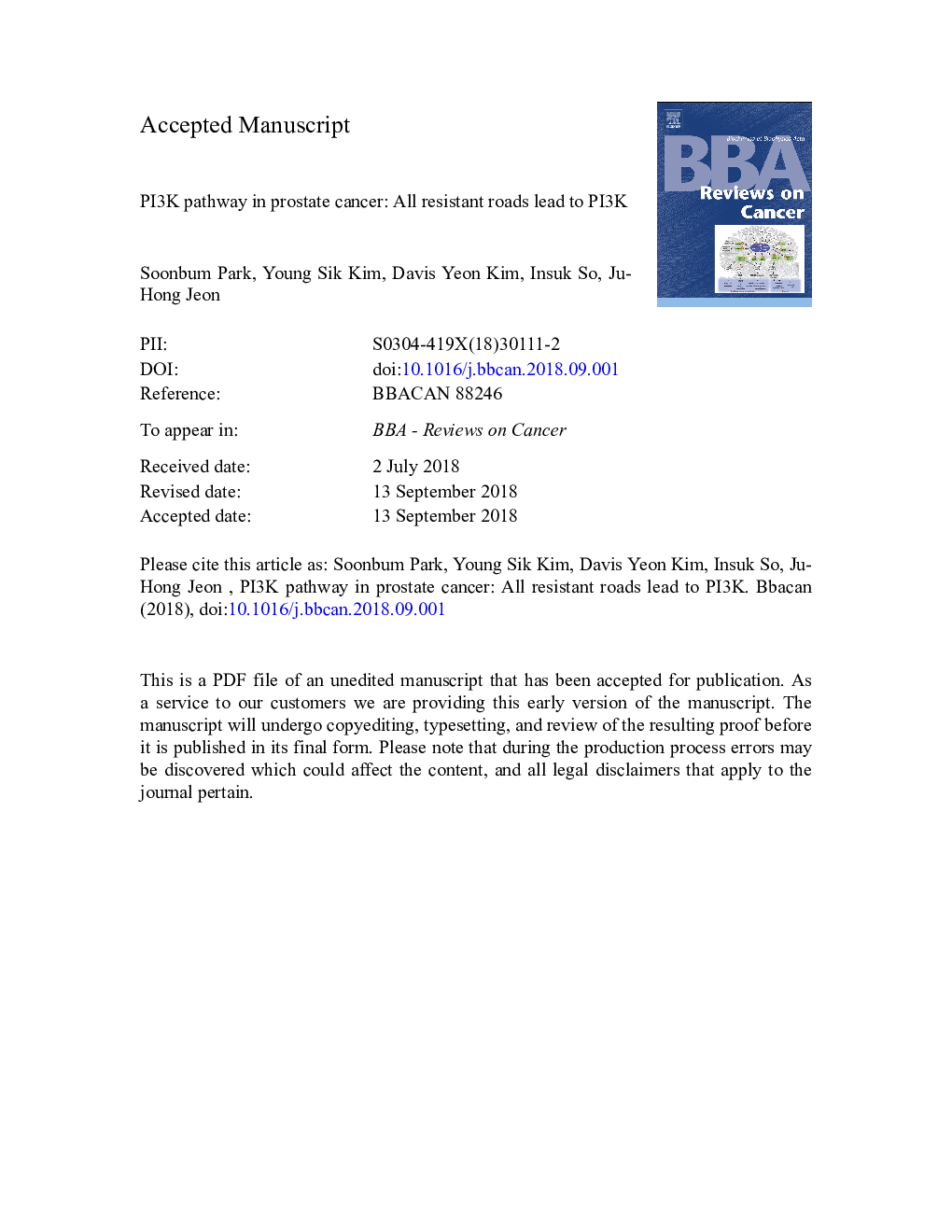| Article ID | Journal | Published Year | Pages | File Type |
|---|---|---|---|---|
| 11007676 | Biochimica et Biophysica Acta (BBA) - Reviews on Cancer | 2018 | 37 Pages |
Abstract
The phosphoinositide 3-kinase (PI3K) pathway integrates multifarious environmental cues to regulate cell survival, growth, and metabolism. Hyperactivation of the PI3K pathway increases biological fitness by offering a high degree of adaptability to and resilience against diverse perturbations, thus conferring survival benefits on premalignant and transformed cells. In prostate cancer, the PI3K pathway is aberrantly activated by various genetic and epigenetic alterations and its hyperactivation is closely associated with a poor clinical outcome. In this review, we discuss the challenges encountered with clinically effective therapies targeting the PI3K pathway in prostate cancer, highlighting the clinical importance of combination therapies. In particular, we address how prostate cancer cells utilize the PI3K pathway for the development of resistance to a broad range of anticancer treatments. In addition, we describe the molecular mechanisms by which prostate cancer cells become resistant to PI3K pathway inhibitors. This review will be helpful in translating biological knowledge into therapeutic strategies for the treatment of prostate cancer and provide insight into overcoming therapeutic challenges associated with prostate cancer.
Keywords
EZH2SGLT2TSCGPCRsCYP17A1IRS1PIP3PDK1IGF1RGSK3βADTCDK4/6CRPCINPP4BABCC1GEMFKBP5eIF4EEGR1PIM1sodium-glucose co-transporter 2PHLPPPI3KFK506 binding protein 5human epidermal growth factor receptor 3CCL2Cytochrome P450 17A1ERKS6KmTORC2BRD4MRP1PD-L1HIF-1HER3Mcl-1eukaryotic translation initiation factor 4EG-protein coupled receptorsMyeloid cell leukemia-1MAPKsMdm2p70 ribosomal protein S6 kinaseRTKsBADenhancer of zeste homolog 2EMTforkhead Box Oc-Junandrogen deprivation therapyretinoblastomainsulin receptor substrate 1Cancer therapyProstate cancerCastration-resistant prostate cancerBEThypoxia-inducible factor-1Vascular endothelial growth factorVascular Endothelial Growth Factor (VEGF)FoxOphosphatase and tensin homologue deleted on chromosome 10phosphatidylinositol-3,4,5-trisphosphatephosphoinositide 3-kinaseProgrammed death ligand 1Mouse double minute 2Bcl-2-associated death promoterResistanceMammalian target of rapamycin complex 2phosphoinositide-dependent kinase 1multidrug resistance protein 1early growth response protein 1PtenTuberous sclerosis complexchemokine (C-C motif) ligand 2Extracellular signal–regulated kinasemitogen-activated protein kinasesEpithelial-mesenchymal transitionGlycogen synthase kinase 3βAndrogen Receptorinsulin receptorreceptor tyrosine kinasesinsulin-like growth factor 1 receptor
Related Topics
Life Sciences
Biochemistry, Genetics and Molecular Biology
Cancer Research
Authors
Soonbum Park, Young Sik Kim, Davis Yeon Kim, Insuk So, Ju-Hong Jeon,
